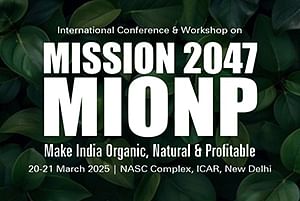
Jitendra Kumar, a progressive farmer from Auraiya district in Uttar Pradesh, is redefining organic and natural farming through his innovative low-cost practices and deep-rooted belief in sustainable agriculture. With dual degrees in Physical Education and Science.
Jitendra initially pursued a career in the bioproducts industry, working as a marketeer for an organic input venture in Goa. However, life took a sudden turn when an accident forced him to leave his job. This setback became a turning point that redirected his journey toward organic agriculture, a field he has passionately engaged in since 2008.

Recently, Jitendra Kumar became part of Krishi Jagran’s initiative, the “Global Farmer Business Network,” to further amplify his mission to promote low-cost natural and organic farming in his state.
Beginning of a Green Journey
Jitendra’s foray into organic farming was not a mere coincidence but a calling shaped by his professional experience and personal conviction. Leveraging his background in bioproducts, he began experimenting with natural farming techniques. Determined to reduce input costs and promote ecological balance, he adopted traditional yet effective farming practices using cow dung, cow urine, crop stubble, and other locally available materials.

After undergoing training at the National Centre for Organic and Natural Farming in Ghaziabad, Jitendra gained in-depth knowledge about organic preparations such as Jeevamrut and the Waste Decomposer. These solutions have since become the cornerstone of his cultivation strategy, helping him maintain soil fertility and crop health without relying on chemical inputs.
Cultivation on His Organic Farm
Jitendra cultivates his 8-acre landholding with a diverse range of crops, focusing primarily on cereals like paddy and maize, pulses such as arhar (pigeon pea), and tuber crops like potato, all produced through entirely organic methods. His core farming philosophy revolves around minimizing the use of even organic fertilizers by maximizing the utilization of on-farm resources. His goal is simple yet impactful: reduce input costs while increasing profit margins through natural means.
This approach has proven successful and Jitendra earns approximately ₹10 lakh annually through his organic farming endeavors. His model serves as a testament to how sustainable farming can be both ecologically sound and economically viable.

Record-Breaking Basmati Yield in 2024
Among his many achievements, Jitendra’s 2024 Basmati rice harvest stands out as a remarkable success story. While most farmers in Auraiya district saw yields averaging 13.6 quintals per acre using conventional urea-based practices, Jitendra’s organic approach yielded an impressive 19.6 quintals per acre. This made him the highest Basmati yielder in the district for the year.
He attributes this success to the strategic application of his modified version of Jeevamrut, which delivers the precise amount of nitrogen Basmati rice requires. Unlike conventional farming, which often results in nitrogen overdose, Jitendra’s method ensures optimum plant nutrition and healthier crops.

A Unique Take on Jeevamrut Preparation
While Jeevamrut is a well-known organic fertilizer made from cow dung, urine, jaggery or molasses, gram flour (besan), and soil, Jitendra has introduced a unique modification to this traditional formulation. Instead of using regular farm soil, he collects virgin soil from deep forest areas, lands untouched by human intervention, rich in microbial life and natural nutrients.
This forest soil significantly enhances the microbial diversity of the Jeevamrut solution, amplifying its effectiveness. More importantly, his version is designed for long-lasting impact. Whereas conventional Jeevamrut must be applied within seven days of preparation and often requires multiple applications, Jitendra’s version needs to be applied just once during land preparation at a dose of 25 liters per acre. This drastically reduces labor and cost, making organic farming more accessible to small and marginal farmers.

Restoring Soil Health: Healing Through Nature
Jitendra strongly believes that Indian agricultural lands, degraded by decades of chemical farming, need not more fertilizers but natural healing. “Our soil doesn’t require fertilizers; it requires restoration,” he asserts. According to him, restoring the soil's original microbial life, similar to what existed before the Green Revolution, is essential for long-term sustainability.
By introducing nutrient-rich, microbe-laden forest soil through his Jeevamrut, he is not only fertilizing the crops but also rejuvenating the land. Over time, this practice helps revive the soil’s natural fertility, reducing the dependency on external inputs.

Sharing Knowledge and Building a Farming Community
Driven by the philosophy of “Use Less, Earn More,” Jitendra is committed to spreading awareness among fellow farmers. He actively trains farmers on low-cost organic farming methods, emphasizing how one can cut down expenses on fertilizers and pesticides, even organic ones by using farm-based inputs creatively and efficiently.
In a commendable effort to democratize access to organic solutions, he distributes one liter each of his Jeevamrut and Waste Decomposer free of cost to every interested farmer. These efforts have helped him build a strong community of environmentally conscious farmers who are transitioning away from chemical agriculture.

Recognition and Leadership
Jitendra’s tireless work in promoting sustainable agriculture has not gone unnoticed. He has received multiple recognitions from the state government for his contributions to organic farming. Currently, he also serves as a full-time trainer for Krishi Vigyan Kendra (KVK) initiatives, where he mentors aspiring and experienced farmers alike.
Through his training sessions and field demonstrations, he continues to inspire hundreds of farmers to shift towards environmentally responsible and economically sustainable farming practices.
A Model for the Future
Jitendra Kumar’s story is one of resilience, innovation, and community leadership. From recovering from a personal setback to becoming a district-level agricultural pioneer, his journey exemplifies how sustainable farming can be a solution not just for individual prosperity but for ecological well-being.
By blending traditional wisdom with modern understanding, Jitendra is healing the land while nurturing livelihoods. His farm is more than a field of crops, it’s a beacon of hope for a greener, healthier future in Indian agriculture.

Global Farmer Business Network (GFBN) is a dynamic platform where agricultural professionals—farmer entrepreneurs, innovators, buyers, investors, and policymakers - converge to share knowledge, experiences, and scale their businesses. Powered by Krishi Jagran, GFBN facilitates meaningful connections and collaborative learning opportunities that drive agricultural innovation and sustainable development through shared expertise. Join GFBN today: https://millionairefarmer.in/gfbn/

















